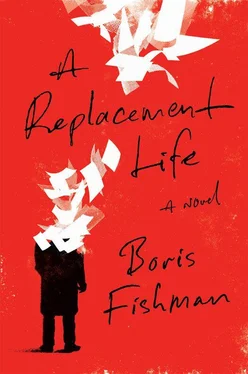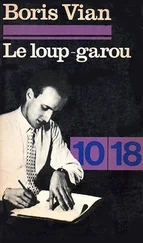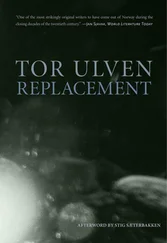“My pleasure,” Morton said. “Not every day Century calls.”
“One last thing,” Slava said, his finger working a groove in the side of an old wooden bookshelf that held reference books on botany and horticulture. “You Can Lead a Whore to Culture…” somebody had handwritten above “Horticulture.” “How would they find out?” he said. “That it’s false?”
“Every fund has its own verification requirements,” Morton said.
“Are there records?” Slava said. “From the war?”
“Very spotty,” Morton said. “The Germans destroyed a lot, and the Russians have always kept theirs close. So it sort of comes down to how persuasive the story is. Whether the facts send up red flags.”
“I see,” Slava said grimly. “Well, I appreciate your time.” Morton started asking when the article would run, so Slava hung up. He sat motionlessly, then wished he’d asked what Morton meant by red flags.
“Hey—” Arianna startled him. She was in the doorway to the library, propping the door open with her hip. How long had she stood there? He marveled again at how lovely she was. The fingers as long and slim as pencils, so slender that they were blue by the morning, even though it was a hundred degrees outside. He would rub them between his, twice as thick. “You okay?” she said.
“Come in,” he said.
“What are you doing in here?”
“Come here.” His cell phone was still flashing Morton’s number, ended call. He pulled her neck toward him and kissed her, swiveling her away from the phone.
“Slava, Avi is heating his lentils around the corner right now .”
“In the armchair, then.” He pointed to a ratty seat around the corner from a bamboo screen, the Austin Miller Home for the Aged. Austin, an editorial assistant, took a powerful south-of-the-border nap there every afternoon.
“Stop,” she said. “At home.” She pulled away and straightened her skirt. Reassured that she hadn’t overheard him, he conceded. “I was going for a walk, if you want,” she said.
He was about to refuse when he thought: Arianna would know something about red flags. She was a fact-checker; it was her job.
“I do,” he said.
“You’re actually going to come with me.”
“You only had to sleep with me.”
Outside, it was less decisively scorching than the day before. The broom of the seasons was starting to sweep summer under the rug. Emerging into the bright light, they slapped their palms against their eyes. Arianna withdrew large sunglasses from her many-buckled purse. “When I leave this place,” she said, “I’m going to write a novel about editorial staffers who work endless hours and then turn into vampires at night.”
“Where to?” he said.
“You choose,” she said.
“I don’t know how to play this game. I don’t want to just stand here.”
“We are the only people on this block standing still.” He followed her gaze: The street scrummed around them, itchy and tense. She told him to close his eyes. He was bumped from behind by someone exiting the building, and given a withering look. “Close your eyes,” she repeated, oblivious. He threw up his hands and walked away from the revolving doors, to a sad wall where the building’s smokers congregated.
“If you just wait for one minute, it’ll come,” she said, joining him.
“I’m waiting,” he said impatiently.
“Sometimes it doesn’t,” she acknowledged.
He rolled his eyes.
“If I’m with someone who’s impatient and annoying, and it just won’t come, then I close my eyes,” she said. “Then I feel like I am in a van Gogh painting. Everything around is a swirl, and I am a still point in the middle.”
He lifted a finger and touched her birthmarked eyelid. She flinched, but her eyes stayed closed. The skin of the eyelid was soft and weary. She never wore makeup.
He saw Mr. Grayson striding out of the elevators, a pack of Merits in his hand like a beacon.
“Okay, let’s go,” Slava said to her.
“Where to?” she said, opening her eyes.
“The park,” he said. “People sit still in the park.”
“What do you know,” she started to say, but he put his hand over her mouth. She wriggled out and he gave chase. They ran up Sixth Avenue.
In Bryant Park, Midtown was sweating through salads. Having hoped to spend their lunch hour pretending in a corner that humanity was not, in fact, pressing in all around, the park’s visitors had no choice but to join strangers at the dollhouse café tables dotting the perimeter. For thirty minutes, they sat next to one another, avoiding eyes.
Slava and Arianna settled onto the grass, still warm in a summer way. Despite being loaded down with a handbag and a wandering skirt, Arianna deposited herself on the ground with a quiet, undemonstrative efficiency. Unspooled against the green, her legs were as pale as plaster.
“How are you holding up,” she said. “I mean your grandmother. You haven’t really talked about it. Sorry if I’m not supposed to bring it up.”
He lowered his head onto her thighs. The air was greasy with summer. “In Uzbekistan,” he said, remembering something his grandfather once told him, “when it’s hot outside, they drink hot tea instead of the opposite.”
“Whenever I ask you about her, you talk about him.”
He thought about it. “She was sick for six years. She was in a car accident and the blood transfusion was bad. She got cirrhosis from it. Her liver didn’t want to work. All the toxins the liver throws out — they stayed inside. Half the time, she was out of it. Her skin was covered with splotches. They itched her like crazy, she would just about rip the skin off. She had to go to the hospital for hydration all the time. Every other month, then every month, then every week. And through all of this, she didn’t complain. You asked her how she was, and she said, ‘Very good.’ She said it in English, those were the two words she knew, and she said it that way so it could be a joke and you’d laugh and it would take attention away from her. What kind of a person is that?” He looked up at Arianna. “Meanwhile, if my grandfather thinks you’ve forgotten about him for a minute, he’ll remind you. He’s the one who talks. So I know him. I don’t know her. I would like to. I would have liked to.”
She didn’t say anything, only rested a palm on his chest. He was grateful to her for not saying anything.
“So what do I have to do now?” he said. “After covering the mirror.”
“You don’t have to do anything,” she said.
“But there are rules,” he said.
She smiled. “There are rules, yes. You mourn for seven days. Which you would be on the tail end of. You sit on low stools.”
“Why?”
“So you aren’t comfortable,” she said.
“So you remember the person.”
“Yes. People bring food so you don’t have to cook. Company, to get you through the worst time.”
“It’s pride to think about it directly?”
“No, I think that would be a Christian problem,” she said. “It’s just painful. In yeshiva, I had a teacher who said, ‘Judaism asks you to be more than yourself and gives you help when you can’t be.’ That’s how I want to live. That’s a merciful God.”
“I thought he was an angry God,” Slava said.
“He’s there, too,” she laughed. “In the form of my mother. But you really don’t have to take all of it. You drown in it and you want to run away completely.”
“That happened to you?” he said.
“No, but I can imagine it,” she said. She ran her hand inside his shirt.
“This heat is demented,” he said.
“August,” she said. “You’re an erotic hallucination.”
Читать дальше











